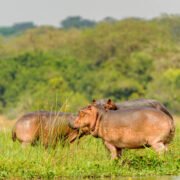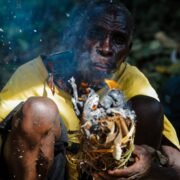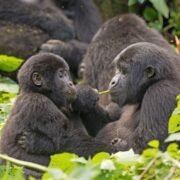
THE UNTOLD STORY OF THE BATWA FOREST KEEPERS
Deep within the lush forests of the Great Lakes region, one of Africa’s oldest indigenous communities continues to preserve a way of life rooted in nature, spirituality and survival. The Batwa, often referred to as the original people of the forest, are a remarkable ethnic group whose story predates modern borders, cities and civilisations. Their history is one of resilience, harmony with nature, displacement and cultural endurance.
Origins of the Batwa
The Batwa are believed to be among the oldest surviving communities in Central and East Africa, with ancestral roots stretching back over 10,000 years. Anthropological studies classify them among Africa’s earliest hunter gatherer populations, long predating the arrival of farming and pastoralist societies in the region.
Historically, they inhabited the dense highland forests across present day Uganda, Rwanda, Burundi and the eastern Democratic Republic of Congo. Their lives were deeply intertwined with the forests of Mgahinga, Bwindi and the Virunga ranges, which provided everything they needed for survival: food, medicine, building materials and sacred spaces for spiritual rituals.
Short in stature and highly skilled in forest craft, the Batwa mastered survival techniques that allowed them to thrive in some of the most challenging wilderness environments. They hunted small game using bows and arrows, gathered wild honey, fruits and roots, and built shelters from branches and leaves. The forest was not just their home, it was their world, identity and spiritual sanctuary.
LIFE BEFORE DISPLACEMENT
Before modern conservation laws and national park demarcations, the Batwa lived as semi nomadic forest dwellers. Movement was guided by food cycles, spiritual seasons and environmental changes. Unlike farming communities, they did not clear land or domesticate animals. Instead, they practised a life of environmental reciprocity, taking only what was needed and giving back through rituals of respect and gratitude.
Music, dance and storytelling formed the heartbeat of their cultural expression. Evenings around firelight were spent passing down ancestral wisdom through chants, folklore and rhythmic songs. Elders held deep knowledge of forest medicine, animal behaviour and weather prediction. Every plant, sound and footprint in the wilderness carried meaning.
Religion and Spiritual Beliefs
The Batwa spiritual system is rooted in animism, a belief that nature is sacred and that spirits reside in natural elements such as mountains, rivers, forests, animals and caves. Their religion was not structured around written doctrine but rather lived through daily interaction with the world around them.
The forest itself was their temple, and their chief deity was often understood to be a supreme creator spirit who inhabited nature rather than watching from above it. Spiritual practices traditionally included:
The worship of forest spirits who protected the community and guided hunters
Ritual offerings of honey, meat or herbs to maintain harmony with nature
Ceremonial dances and trance like chants to communicate with the spirit world
Healing rituals performed by spiritual elders using forest plants and incantation
Unlike many modern religions, Batwa spirituality did not separate the physical world from the divine. The divine was present in footprints, rivers, animal calls and rustling leaves. To harm nature was to disrupt spiritual balance.
DISPLACEMENT AND ITS IMPACT
The Batwa’s way of life changed dramatically in the 20th century with the creation of protected forest national parks. Conservation efforts, though beneficial for wildlife, resulted in the removal of indigenous forest communities from ancestral lands. Without formal land rights, the Batwa were among those relocated, often without compensation or long term resettlement support.
Suddenly, the forest that had sustained their identity for millennia was no longer accessible. A people who had lived without planting were pushed into farming. A community that once moved freely was forced into fixed settlements. The effects were devastating:
Loss of access to traditional hunting and gathering
Erosion of cultural identity and spiritual practices
Economic hardship and marginalisation
Loss of ancestral burial grounds and sacred forest sites
Many Batwa families were compelled to rebuild their lives on the fringes of villages that did not share their language, customs or way of life.
Cultural Revival and New Hope
Despite these challenges, the Batwa remain fiercely determined to preserve their heritage. In recent years, community led initiatives, advocacy groups and sustainable tourism have played an important role in cultural revival and economic empowerment.
In Uganda and Rwanda, Batwa cultural experiences now offer visitors respectful insight into their traditions, including:
Forest storytelling and ancestral history
Traditional dance and music performances
Demonstrations of ancient hunting and honey harvesting techniques
Herbal medicine education and craft making
These cultural exchanges not only generate income for Batwa families but also restore pride in a heritage once at risk of disappearing.
The Legacy of the Batwa
The Batwa story is not one of extinction but of endurance. They are a living testament to humanity’s oldest connection to nature, a community that survived thousands of years by understanding the laws of the forest rather than rewriting them.
Their wisdom carries lessons the modern world urgently needs:
That nature is not a resource to exploit, but a relative to respect
That survival and sustainability are inseparable
That culture, once lost, is never easily replaced
The Batwa may no longer live fully inside the forests of their ancestors, but the forest still lives within them. Their songs, spirits, knowledge and resilience echo through generations, reminding us that Africa’s oldest roots still stand firm.
Their story is not just history.
It is heritage.
It is identity.
And above all, it is a call to remember the people who knew the forest long before the world tried to protect it.



